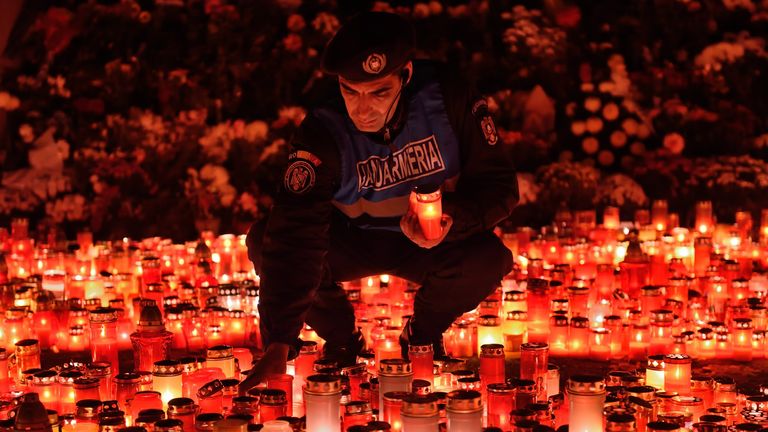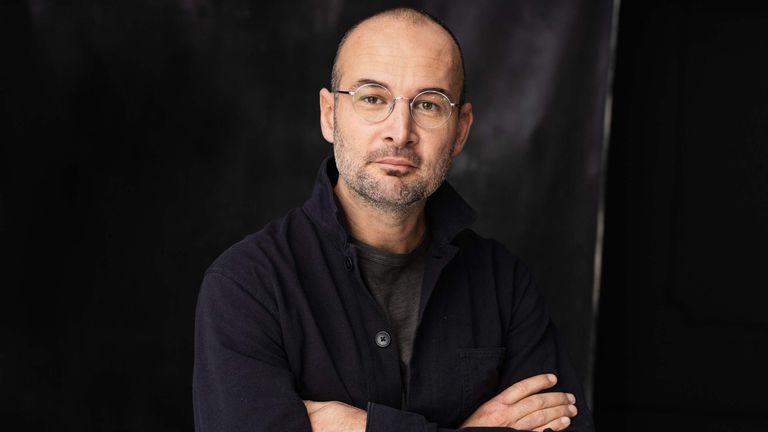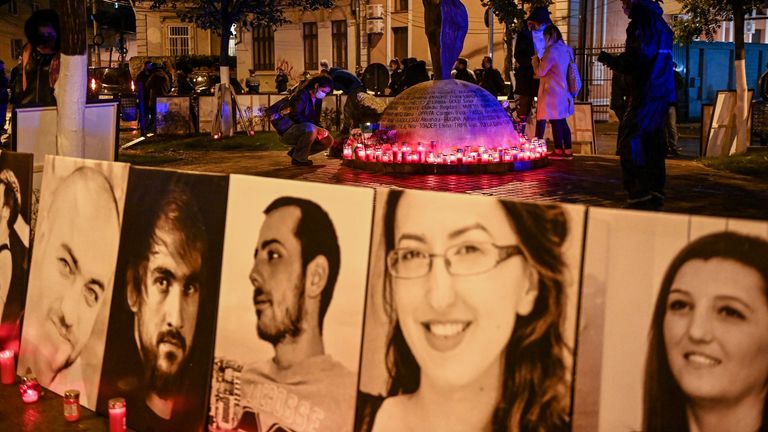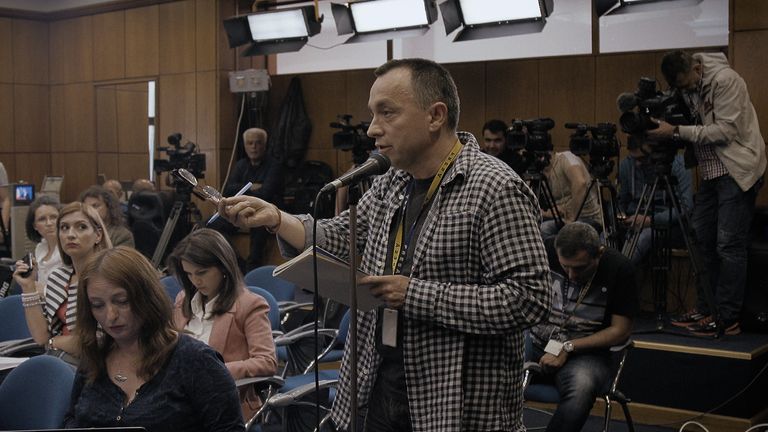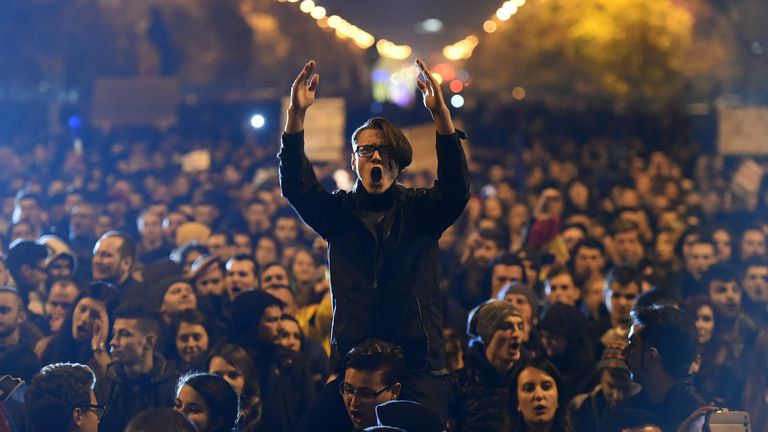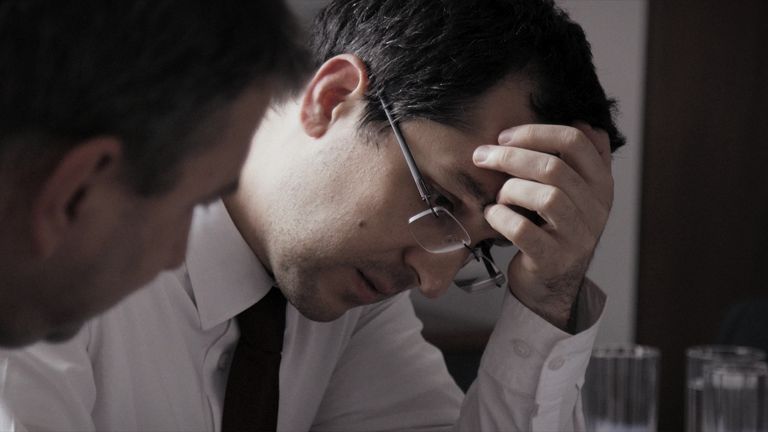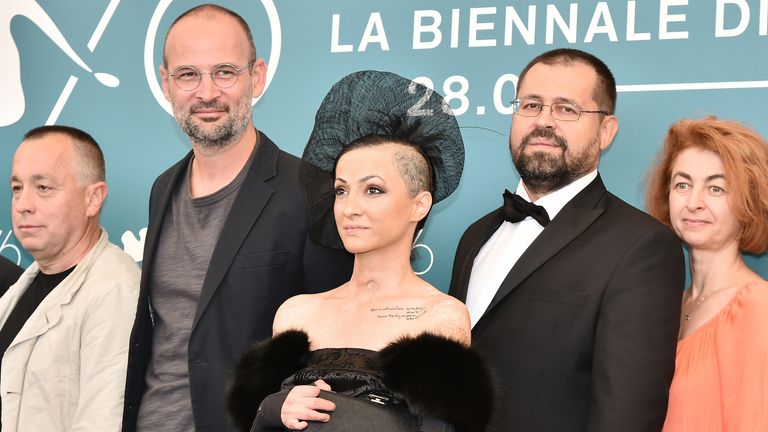“I expected corruption, I never expected the lack of humanity.”
Alexander Nanau is the Emmy award-winning director behind Collective, the hard-hitting documentary showing the aftermath of the 2015 Bucharest nightclub fire that killed 64 people and brought down the Romanian government.
It’s a raw and graphic movie, featuring no interviews and no voiceovers, just the story of a tragic accident that uncovers weaknesses in the Romanian healthcare system and alleges political corruption on an industrial scale.
He tells Sky News: “It’s a lack of humanity that I can’t wrap my head around… I didn’t think we were still living in medieval times.”
The documentary has been well-received in the UK, with glowing reviews and endorsements from celebrities including Russell Brand and Jon Snow.
It’s also Romania’s official Oscar entry in the best foreign film category – but it’s likely not to be a submission loudly shouted about from the rooftops by its country’s leaders.
The film starts with footage that shocks you to the core. We witness the unbelievable speed at which the fire ripped through the Colectiv nightclub on 30 October 2015.
It’s a moment captured by clubbers on mobile phones, little knowing they’re filming an event that will change their lives.
“F*** all your wicked corruption. It’s been there since our inception,” yells metalcore band Goodbye To Gravity’s lead singer Andrei Galut, before stopping to say, “Something’s on fire here… It’s not part of the show.”
Flames, smoke and panic follow in seconds, as a pyrotechnic spark ignites acoustic foam in the ceiling, killing 27 people that night and going on to kill many more.
Galut is the only one of the five band members who survived the blaze.
And that’s not the only graphic footage in the documentary. Later we see a secretly filmed video shot by a whistleblower doctor, showing an injured patient with maggots crawling from their wounds.
Despite not being badly burned, we are told the patient died soon after the footage was shot.
It’s an environment in which we’re told hospital staff routinely covered patients’ faces with bed sheets “so as not to have to look at them”.
But these vivid moments – as difficult as they are to watch – are not the most shocking part of the film.
The growing horror at realising that some burns patients were dying – not because of their initial injuries but due to infections developed in the very hospitals that should have been curing them – serves that role.
Aside from the 27 people killed in the nightclub, 180 were injured. In the weeks after the tragedy 37 of the injured died.
The man who broke the story, newspaper editor Catalin Tolontan, tells Sky News that in Romania “doctors are Gods”, and subsequently even members of his own family warned him not to dig deep into the story. But he didn’t let that stop him.
According to the documentary team, many of those deaths were due to inadequate hospital care.
In the days that followed the fire, Romania insisted it had the capacity to treat the victims and repeatedly turned down offers of assistance from EU countries.
Nanau says: “You cannot treat 180 burned patients in a country without burns units. It’s just not possible it’s a big lie.”
He says patients were only transferred abroad for treatment around eight days after the fire, meaning some who had suffered non-life-threatening burns went on to die from bacterial infections that had developed in Romanian hospitals.
The resistant strains of bacteria found on the wounds of some patients were apparently met with disbelief by foreign doctors treating their wounds.
Tolontan says: “They said they saw this kind of bacteria only in Afghanistan, in Iraq, in the war zones.”
Revelations uncovered by Tolontan’s team at the Sports Gazette led to the resignation of the health minister.
And herein lies the scandal at the heart of the story. An independent analysis of disinfectants and antiseptics produced by pharmaceutical firm Hexi Pharma – ordered by then-prime minister Dacian Ciolos at chemical research facility the Icechim Institute – found that some active ingredients had been diluted down to just 1% against a 12% recommended concentration.
One active ingredient of surgeons’ hand wash listed on the label as being 25% registered at just 0.01% in laboratory tests. And most disinfectants were once again diluted for use once they reached the hospital.
Hexi Pharma was responsible for supplying around 340 hospitals across Romania with disinfectants and antiseptics.
A later analysis of all 39 Hexi Pharma products – ordered by prosecutors and carried out both in Romania and abroad – confirmed that none were compliant with government standards and were not effective in killing germs.
Interim health minister and former patient’s rights activist Vlad Voiculescu, who gave the documentary makers unprecedented access to his meetings throughout the film, is captured on camera incredulous that those disinfectants are still being used in hospitals despite the results.
It later comes to light in the film that previous warnings to the intelligence service over the dilution of products had been repeatedly ignored.
Adding to the drama around the tragedy, the owner of Hexi Pharma died in a car accident seven months after the fire.
Nanau says the messages in the film are not just a wake-up call for Romania, but also the wider world – the UK included.
Recent revelations that since the outbreak of the coronavirus pandemic, the UK government has awarded billions of pounds of taxpayers’ money to companies directly linked to the Tory party has raised eyebrows.
A National Audit Office (NAO) investigation into pandemic procurement found that normal standards of transparency were waived and deals worth £10.5bn were granted without competitive tender.
The contracts were handed out after the government changed its guidance on procurement because of the crisis. It’s a revelation that has led to questions about the transparency in our own healthcare system.
In response to the investigation, the Cabinet Office told Sky News: “We needed to procure contracts with extreme urgency to secure the vital supplies required to protect frontline NHS workers and the public…
“We have robust processes in place for spending public money to ensure we get critical equipment to where it needs to go as quickly as possible, whilst also ensuring value for money for the taxpayer.”
They said that while they “welcome” the NAO’s scrutiny, they “make no apology for” decisions on how taxpayers’ money was spent.
Nanau is of the opinion that those in power “live on a different planet” and is not at all surprised that public tenders have fallen by the wayside during the coronavirus pandemic.
It’s been five-years since the Colectiv club fire, but have things changed in Romania since the documentary was made?
Just last week, a fire in a Romanian intensive care unit (ICU) killed 10 and critically injured seven others.
A doctor branded a “hero” for pulling patients from the fire suffered burns to 40% of his body and was sent to Belgium for treatment.
Nanau feels that “public pressure” played a large part in the government’s decision to have him treated abroad.
He says it was initially publicly announced by the current health minister that the doctor would be treated in Romania, in an ICU which he claims has no facilities for burns patients.
As to whether the 1,000 plus patients currently being treated for COVID in ICU in Romania are receiving good care, he says the hospitals are currently reporting “zero hospital infections”.
It’s an exemplary figure Nanau is sceptical about.
Data collected from four of the biggest hospitals in Romania by Tolontan, covering the period from the start of the pandemic to 10 November show that just over 89% of intubated COVID-19 patients died during ICU care.
For comparison, data published by the Intensive Care National Audit & Research Centre showed that less than 50% of intubated COVID-19 patients admitted to UK hospitals since the start of the pandemic up to the end of August have died.
In the documentary, interim health minister Voiculescu – despite his official ministerial role still speaking like an activist – explains: “The entire [hospital manager] selection process is rotten to the core”. He goes on to compare making the system fair as being “like training a pig to dance”.
He says he wants to make the healthcare system “more transparent and solid”. One way he intends to do this is to “stop lying”. But by the end of the film a new social democrat government is voted in, meaning his temporary tenure is at an end.
It’s not clear how many of his reforms will be implemented, or how many of the documentary’s claims will be acted upon.
:: Subscribe to the Backstage podcast on Apple Podcasts, Google Podcasts, Spotify, Spreaker
Back in the present day, Romania has just had its local elections, in which reformative parties did well in many cities. Their national elections will follow in December and Nanau is positive about his country’s future.
“People want change,” he says, pointing to several new political parties promising “zero tolerance for corruption” and “reorganisation of the public sector”.
Only time will tell if such change is coming, but in the meantime, Nanau and Tolontan will continue their campaign to open the world’s eyes to abuse of power. In times of crisis it seems, it’s a service that is needed more than ever.
Sky News has contacted Romania’s cultural ministry for comment.
Collective is available to stream on platforms including iTunes, Amazon Prime Video and Curzon Home Cinema from Friday, 20 November 2020.
Nominations for the 92nd Academy Awards will be announced on Monday 13 January 2021.

